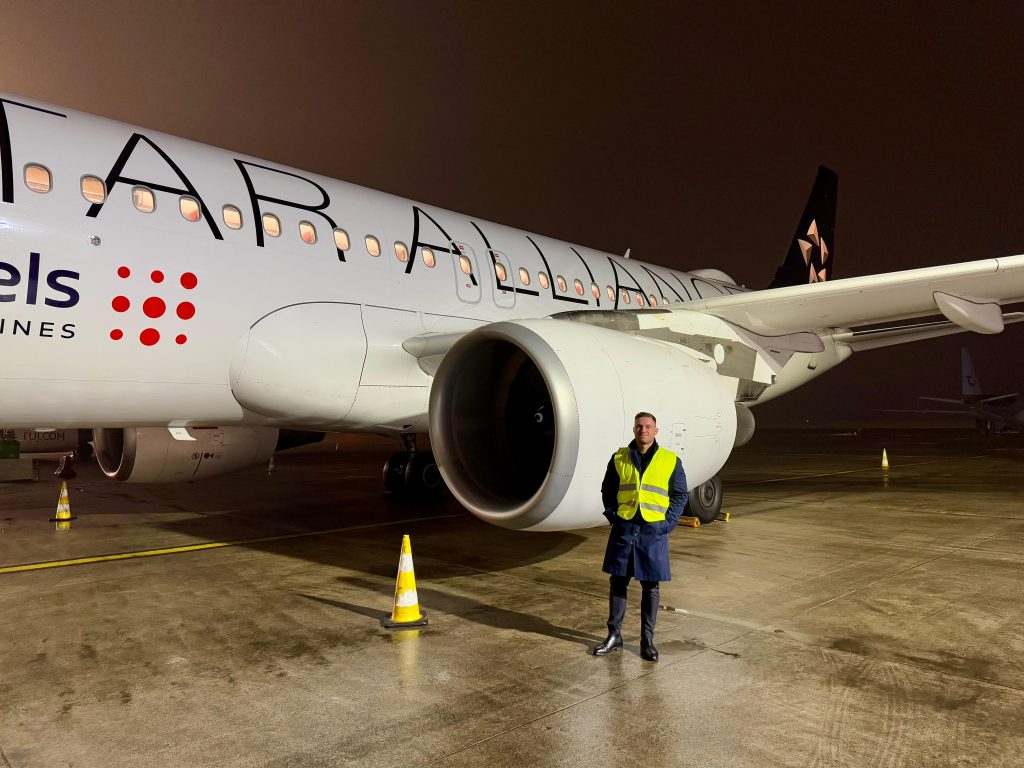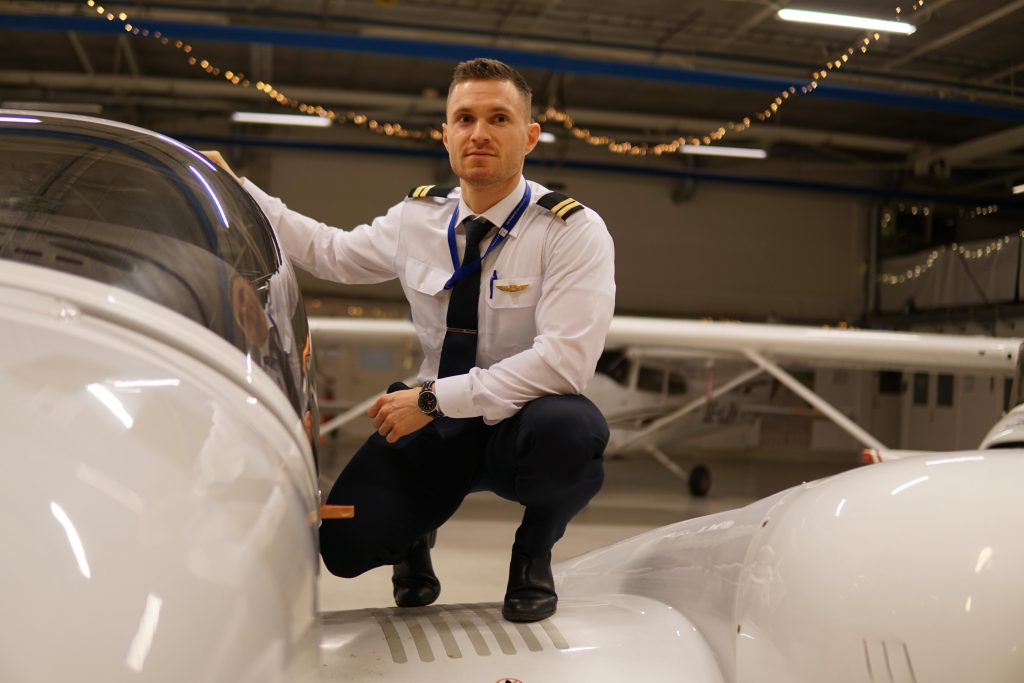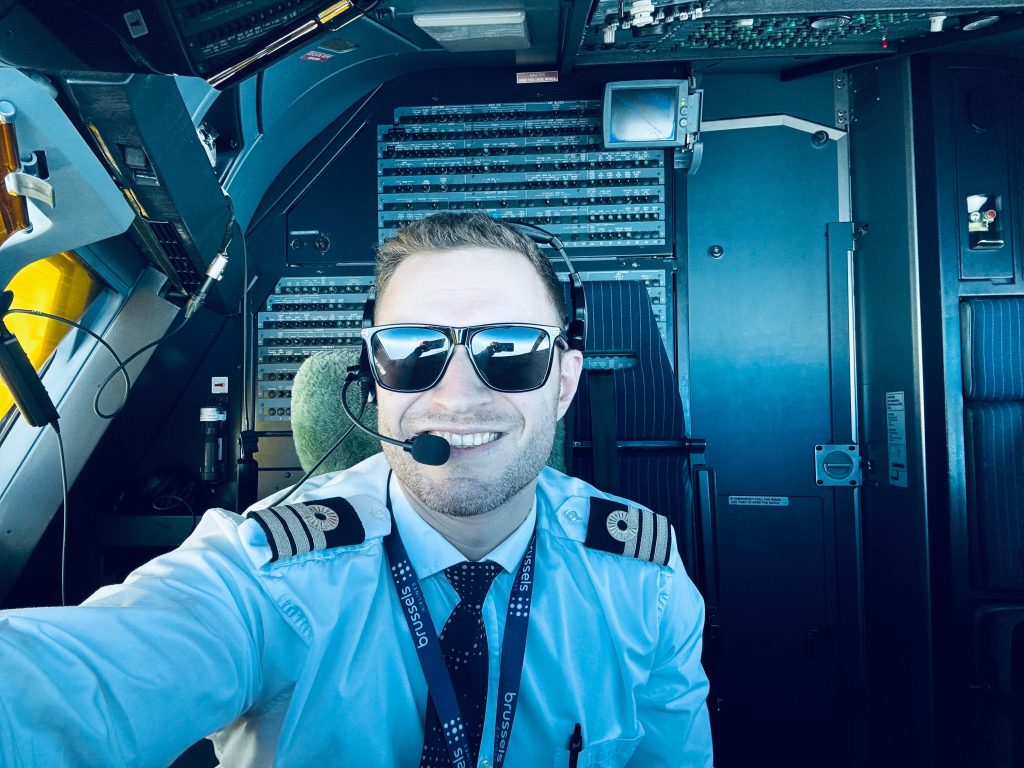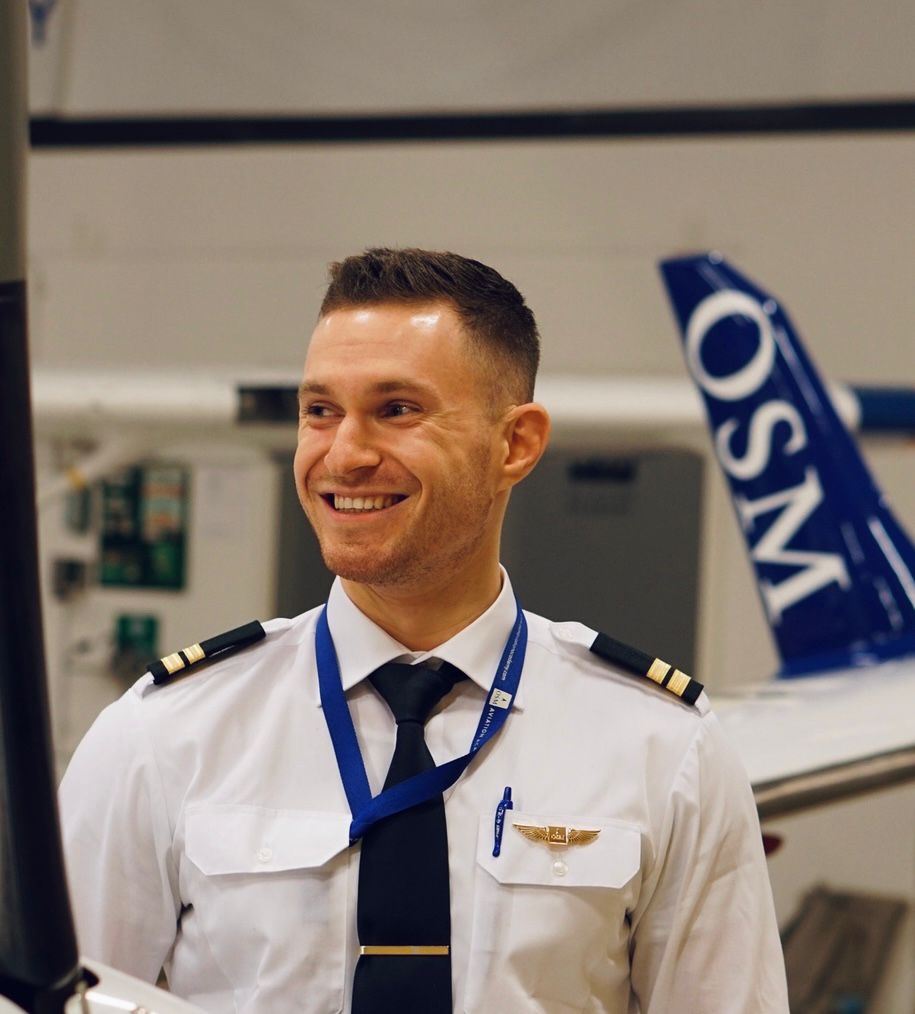
How did your training at OSM shape you as a pilot?
ATPL theory was some of the most rigorous training I have gone through. Trying to find the most efficient way to study while making long hours and also combining it with the ongoing flight training, was rough! Looking back at it now, my work ethic evolved and I really enjoy looking back at how much we all worked. It created a new standard way of working for me, knowing I can do so much more than I initially imagined.
Why did you choose to attend OSM, and what made you apply for Brussels Airlines?
I attended OSM because of the mixed training style that combines theory with flying. It was a sense of adventure to explore Scandinavia with C172’s that are equipped with a modern glass cockpit while also learning about a new culture.
I applied to Brussels Airlines because it is close to my hometown and I really enjoy their network. Flying to remote destinations but also the busy Lufthansa Group destinations was something I really wanted to explore and learn from. As a pilot, your job often determines a big part of your lifestyle, and after looking into Brussels Airlines, I found that this was the right fit for me.
Did you have any memorable memories from your time at OSM?
Absolutely! Of course the first solo is one of the most memorable of all. Flying an aircraft for the first time by yourself is an amazing sense of achievement. However, besides my personal flying experiences; although it sounds cliché, meeting people who become friends, and later on sharing our achievements together is – still to this day – very valuable.

What type of help did you get for your assessment with Brussels Airlines?
I refreshed my ATPL theory, studied the airline and I tried to prepare myself for the psychometric and reasoning tests as much as possible. Your own notes and experiences can help you get back into the theory and that made me feel more confident going into a technical interview. Also, discussing the topics of the HR-interview with colleagues from OSM gave me a better insight into what questions to ask myself.
Do you have any tips for pilots considering applying to Brussels Airlines?
Preparation = Key!!!
One of the most important qualities of a good airline pilot is to prepare for possible scenarios. Learn about the airline, refresh your ATPL theory and try to honestly answer some key questions for yourself such as “Why Brussels…” “What are my strengths / weaknesses…” etc.
What changes in the aviation industry have you noticed during your time as a pilot?
Starting my flight training in the pandemic might be one of the biggest changes we have seen in the aviation industry. When I started at OSM, nobody was certain how aviation would look like in a few years. Now, in 2025, aviation has made a complete comeback!
Although the pandemic has been an extreme example, the aviation industry will always fluctuate. Whether it is the economy or another factor, fluctuations will happen, but it is important that you remain focused on your goal. If you want to become a pilot, don’t let others convince you that ‘now’ is not the right time. When our class started, some said that aviation will never come back and I am happy I went for my dream!
What’s the biggest difference between flying as a student and flying as an airline pilot?
For me, the external factors make the difference; handling with passengers, interacting with the gate agent / redcap and working together with the crew and airline (OCC and Maintenance). For example; it is quite common that, during your setup before the flight, the gate agent comes in and asks you something regarding a passenger or your fuel that you want to uplift. In the beginning this can be quite distracting but it also makes it more fun! Every flight comes with a new set of challenges and every flight you can learn something new!

What does a day in the life of a Brussel Airline pilot look like?
Before going to the airport, I check my EFB (ipad) and take a look at the flightplan, fuel, notams, aircraft status and the weather. After having a good mental picture of what my day is going to look like, I drive to the airport. There is always the option to do this at the airport in the lounge where you can prepare with others should you have any questions.
After arriving at the airport, going through security, it is time to find my aircraft and meet up with my crew for the day (or for the next few days if we are going on a trip). The captain and I take a decision on the fuel and we can discuss the topics that I have looked at whilst being at home. The inbound crew gives us a small briefing about the aircraft and then it’s our turn! We start setting up the aircraft and before you know it, the boarding has started and the timing is ticking 🙂 We take-off and land at the destination, flights can vary from short ones all the way to 4+ hours which makes your destination list a lot of fun and diverse.
The passengers deboard and new passengers board shortly after, and the process starts over! We fly back home to Brussels where we either shut down the aircraft completely or we meet up with the new crew (depending on the time of day). And tomorrow we do it again!
How does your schedule affect your work-life balance? (fixed schedule or flexible)
At Brussels Airlines you have a flexible roster but you can make requests to make your roster more suitable for a life you enjoy. For me, I enjoy late afternoon and evening flights with a good mix of both nightstops but also time at home. Your roster will have a major influence on how your day-to-day looks and I’m happy that with Brussels Airlines I can actually tailor some parts of my roster to my liking!
How do you prepare for a flight at Brussel Airlines?

What types of positions do pilots generally start in at Brussels Airlines (First Officer, Second Officer, etc.)?
Currently, most pilots will join as First Officer on the A32F, depending on previous experience the salary entry level might differ.
How was your type rating with Brussels Airlines?
As my second typerating, I felt a similar experience. Brussels Airlines provides the typerating themselves which made it fun to already meet a lot of different colleagues from the company. After the theory, the simulator session started which I had in Madrid, Amsterdam and Brussels.
I found that the MCC in OSM was very valuable during my typeratings, it sets a good tone and you get a feeling of what a typerating is like when it comes to the simulator sessions.
After the typerating, the final part is the base training; the first time you actually fly the aircraft in real life!
What are some of the benefits of becoming a pilot at Brussels Airlines?
Flying to a lot of destinations with nightstops in different big cities is something I really enjoy. One day we ‘simply’ fly to a destination and back in an A319 and the next day we might fly an A320neo to Stockholm and stay the night. The mix of both makes it a lot of fun!
Flying longer in the airline, you also could upgrade to flying long haul on the A330, primarily to Africa and to America.
As a small bonus: becoming a pilot at Brussels Airlines means that you will be part of the Lufthansa Group and also Star Alliance and thus you will be able to fly most airlines with discounted rates.